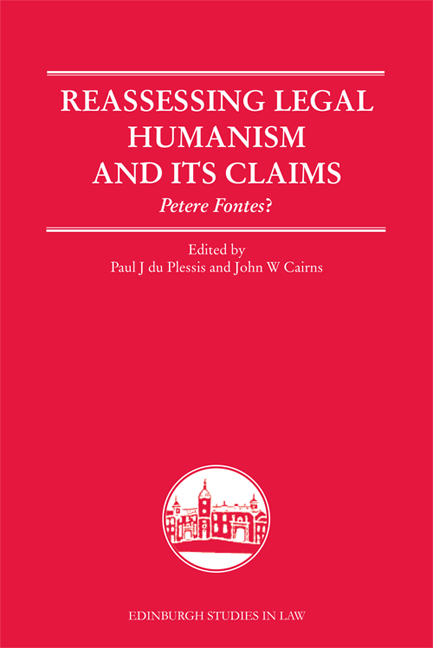Book contents
- Frontmatter
- Contents
- Preface
- A Note on Names and Book Titles
- List of Contributors
- List of Abbreviations
- Introduction
- Part I DEFINING LEGAL HUMANISM
- 1 Antiqui et Recentiores: Alberico Gentili–Beyond Mos Italicus and Legal Humanism
- 2 Humanist Philology and the Text of Justinian's Digest
- Part II A BREAK WITH THE PAST/CONTEMPORARY CRITIQUES
- Part III LEGAL HUMANISM: A PAN-EUROPEAN METHODOLOGY?
- Part IV LEGAL HUMANISM AND THE BOOK TRADE
- Postscript
- Index
2 - Humanist Philology and the Text of Justinian's Digest
from Part I - DEFINING LEGAL HUMANISM
Published online by Cambridge University Press: 05 September 2016
- Frontmatter
- Contents
- Preface
- A Note on Names and Book Titles
- List of Contributors
- List of Abbreviations
- Introduction
- Part I DEFINING LEGAL HUMANISM
- 1 Antiqui et Recentiores: Alberico Gentili–Beyond Mos Italicus and Legal Humanism
- 2 Humanist Philology and the Text of Justinian's Digest
- Part II A BREAK WITH THE PAST/CONTEMPORARY CRITIQUES
- Part III LEGAL HUMANISM: A PAN-EUROPEAN METHODOLOGY?
- Part IV LEGAL HUMANISM AND THE BOOK TRADE
- Postscript
- Index
Summary
A. INTRODUCTION
B. THE CHARACTER OF ALCIATUS’ PHILOLOGICAL WORK
C. THE WORKING METHODS OF THE HUMANIST EDITORS
D. CONCLUSIONS
INTRODUCTION
It is an axiom of European legal history that the advent of humanist philology led to a more accurate text of Justinian's Digest, which finally came to be liberated from the accumulated errors of the preceding centuries of darkness and ignorance. This, indeed, is the message broadcast on the title-pages of the sixteenth-century editions, and in a sense it has been repeated ever since. But what exactly is this humanist philology, and what kind of purged, emended, pristine, accurate texts of the Digest did it produce?
The first half of the sixteenth century confronts us with Erasmus’ famous triumvirate of Alciatus, Budaeus and Zasius, but as in other triumvirates, one figure soon faded into the background, while another emerged as the clear front-runner. So it is Andreas Alciatus who has gone down in legal history as the first jurist to introduce the philological method into the study of Roman law. From his earliest work, the Annotations on the Tres Libri of the Code, published in 1515, to the final two books of the Parerga, published in 1554, four years after his death, much of Alciatus’ scholarly effort was directed towards textual criticism of the Roman legal sources. An investigation of the influence of this work on the Digest text may conveniently be subsumed under two questions. First, what is the character of the philological work which Alciatus delivered into the hands of the sixteenth-century humanist editors of the Digest? And, secondly, how did these editors set about using this material in producing their texts?
THE CHARACTER OF ALCIATUS’ PHILOLOGICAL WORK
Despite the flood of sixteenth-century editions of the Corpus Iuris Civilis flowing year after year from the printing houses of Paris and Lyon, the scope of our enquiry turns out to be surprisingly limited– limited, in fact, to three humanist editions published in the 1520s. The work of Alciatus which is particularly relevant to our enquiry is therefore the collection he published at Milan in 1518.
- Type
- Chapter
- Information
- Reassessing Legal Humanism and its ClaimsPetere Fontes?, pp. 41 - 56Publisher: Edinburgh University PressPrint publication year: 2015



